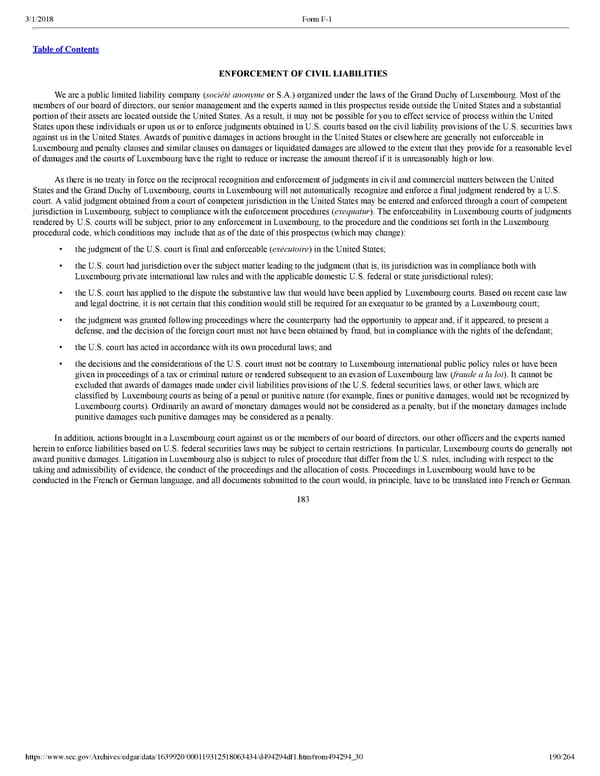190/264 ENFORCEMENT OF CIVIL LIABILITIES We are a public limited liability company ( société anonyme or S.A.) organized under the laws of the Grand Duchy of Luxembourg. Most of the members of our board of directors, our senior management and the experts named in this prospectus reside outside the United States and a substantial portion of their assets are located outside the United States. As a result, it may not be possible for you to effect service of process within the United States upon these individuals or upon us or to enforce judgments obtained in U.S. courts based on the civil liability provisions of the U.S. securities laws against us in the United States. Awards of punitive damages in actions brought in the United States or elsewhere are generally not enforceable in Luxembourg and penalty clauses and similar clauses on damages or liquidated damages are allowed to the extent that they provide for a reasonable level of damages and the courts of Luxembourg have the right to reduce or increase the amount thereof if it is unreasonably high or low. As there is no treaty in force on the reciprocal recognition and enforcement of judgments in civil and commercial matters between the United States and the Grand Duchy of Luxembourg, courts in Luxembourg will not automatically recognize and enforce a final judgment rendered by a U.S. court. A valid judgment obtained from a court of competent jurisdiction in the United States may be entered and enforced through a court of competent jurisdiction in Luxembourg, subject to compliance with the enforcement procedures ( exequatur ). The enforceability in Luxembourg courts of judgments rendered by U.S. courts will be subject, prior to any enforcement in Luxembourg, to the procedure and the conditions set forth in the Luxembourg procedural code, which conditions may include that as of the date of this prospectus (which may change): • the judgment of the U.S. court is final and enforceable ( exécutoire ) in the United States; • the U.S. court had jurisdiction over the subject matter leading to the judgment (that is, its jurisdiction was in compliance both with Luxembourg private international law rules and with the applicable domestic U.S. federal or state jurisdictional rules); • the U.S. court has applied to the dispute the substantive law that would have been applied by Luxembourg courts. Based on recent case law and legal doctrine, it is not certain that this condition would still be required for an exequatur to be granted by a Luxembourg court; • the judgment was granted following proceedings where the counterparty had the opportunity to appear and, if it appeared, to present a defense, and the decision of the foreign court must not have been obtained by fraud, but in compliance with the rights of the defendant; • the U.S. court has acted in accordance with its own procedural laws; and • the decisions and the considerations of the U.S. court must not be contrary to Luxembourg international public policy rules or have been given in proceedings of a tax or criminal nature or rendered subsequent to an evasion of Luxembourg law ( fraude a la loi ). It cannot be excluded that awards of damages made under civil liabilities provisions of the U.S. federal securities laws, or other laws, which are classified by Luxembourg courts as being of a penal or punitive nature (for example, fines or punitive damages, would not be recognized by Luxembourg courts). Ordinarily an award of monetary damages would not be considered as a penalty, but if the monetary damages include punitive damages such punitive damages may be considered as a penalty. In addition, actions brought in a Luxembourg court against us or the members of our board of directors, our other officers and the experts named herein to enforce liabilities based on U.S. federal securities laws may be subject to certain restrictions. In particular, Luxembourg courts do generally not award punitive damages. Litigation in Luxembourg also is subject to rules of procedure that differ from the U.S. rules, including with respect to the taking and admissibility of evidence, the conduct of the proceedings and the allocation of costs. Proceedings in Luxembourg would have to be conducted in the French or German language, and all documents submitted to the court would, in principle, have to be translated into French or German. 183
 Spotify F1 | Interactive Prospectus Page 189 Page 191
Spotify F1 | Interactive Prospectus Page 189 Page 191